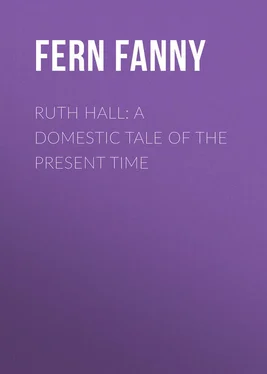Fanny Fern - Ruth Hall - A Domestic Tale of the Present Time
Здесь есть возможность читать онлайн «Fanny Fern - Ruth Hall - A Domestic Tale of the Present Time» — ознакомительный отрывок электронной книги совершенно бесплатно, а после прочтения отрывка купить полную версию. В некоторых случаях можно слушать аудио, скачать через торрент в формате fb2 и присутствует краткое содержание. Жанр: foreign_antique, foreign_prose, на английском языке. Описание произведения, (предисловие) а так же отзывы посетителей доступны на портале библиотеки ЛибКат.
- Название:Ruth Hall: A Domestic Tale of the Present Time
- Автор:
- Жанр:
- Год:неизвестен
- ISBN:нет данных
- Рейтинг книги:3 / 5. Голосов: 1
-
Избранное:Добавить в избранное
- Отзывы:
-
Ваша оценка:
- 60
- 1
- 2
- 3
- 4
- 5
Ruth Hall: A Domestic Tale of the Present Time: краткое содержание, описание и аннотация
Предлагаем к чтению аннотацию, описание, краткое содержание или предисловие (зависит от того, что написал сам автор книги «Ruth Hall: A Domestic Tale of the Present Time»). Если вы не нашли необходимую информацию о книге — напишите в комментариях, мы постараемся отыскать её.
Ruth Hall: A Domestic Tale of the Present Time — читать онлайн ознакомительный отрывок
Ниже представлен текст книги, разбитый по страницам. Система сохранения места последней прочитанной страницы, позволяет с удобством читать онлайн бесплатно книгу «Ruth Hall: A Domestic Tale of the Present Time», без необходимости каждый раз заново искать на чём Вы остановились. Поставьте закладку, и сможете в любой момент перейти на страницу, на которой закончили чтение.
Интервал:
Закладка:
Fanny Fern
Ruth Hall: A Domestic Tale of the Present Time
PREFACE
I present you with my first continuous story. I do not dignify it by the name of “A novel.” I am aware that it is entirely at variance with all set rules for novel-writing. There is no intricate plot; there are no startling developments, no hair-breadth escapes. I have compressed into one volume what I might have expanded into two or three. I have avoided long introductions and descriptions, and have entered unceremoniously and unannounced, into people’s houses, without stopping to ring the bell. Whether you will fancy this primitive mode of calling, whether you will like the company to which it introduces you, or – whether you will like the book at all, I cannot tell. Still, I cherish the hope that, somewhere in the length and breadth of the land, it may fan into a flame, in some tried heart, the fading embers of hope, well-nigh extinguished by wintry fortune and summer friends.
FANNY FERN.CHAPTER I
The old church clock rang solemnly out on the midnight air. Ruth started. For hours she had sat there, leaning her cheek upon her hand, and gazing through the open space between the rows of brick walls, upon the sparkling waters of the bay, glancing and quivering ’neath the moon-beams. The city’s busy hum had long since died away; myriad restless eyes had closed in peaceful slumber; Ruth could not sleep. This was the last time she would sit at that little window. The morrow would find her in a home of her own. On the morrow Ruth would be a bride.
Ruth was not sighing because she was about to leave her father’s roof, (for her childhood had been anything but happy,) but she was vainly trying to look into a future, which God has mercifully veiled from curious eyes. Had that craving heart of hers at length found its ark of refuge? Would clouds or sunshine, joy or sorrow, tears or smiles, predominate in her future? Who could tell? The silent stars returned her no answer. Would a harsh word ever fall from lips which now breathed only love? Would the step whose lightest footfall now made her heart leap, ever sound in her ear like a death-knell? As time, with its ceaseless changes, rolled on, would love flee affrighted from the bent form, and silver locks, and faltering footstep? Was there no talisman to keep him?
“Strange questions,” were they, “for a young girl!” Ah, but Ruth could remember when she was no taller than a rosebush, how cravingly her little heart cried out for love! How a careless word, powerless to wound one less sensitive, would send her, weeping, to that little room for hours; and, young as she was, life’s pains seemed already more to her than life’s pleasures. Would it always be so? Would she find more thorns than roses in her future pathway?
Then, Ruth remembered how she used to wish she were beautiful, – not that she might be admired, but that she might be loved. But Ruth was “very plain,” – so her brother Hyacinth told her, and “awkward,” too; she had heard that ever since she could remember; and the recollection of it dyed her cheek with blushes, whenever a stranger made his appearance in the home circle.
So, Ruth was fonder of being alone by herself; and then, they called her “odd,” and “queer,” and wondered if she would “ever make anything;” and Ruth used to wonder, too; and sometimes she asked herself why a sweet strain of music, or a fine passage in a poem, made her heart thrill, and her whole frame quiver with emotion?
The world smiled on her brother Hyacinth. He was handsome, and gifted. He could win fame, and what was better, love. Ruth wished he would love her a little. She often used to steal into his room and “right” his papers, when the stupid housemaid had displaced them; and often she would prepare him a tempting little lunch, and carry it to his room, on his return from his morning walk; but Hyacinth would only say, “Oh, it is you, Ruth, is it? I thought it was Bridget;” and go on reading his newspaper.
Ruth’s mother was dead. Ruth did not remember a great deal about her – only that she always looked uneasy about the time her father was expected home; and when his step was heard in the hall, she would say in a whisper, to Hyacinth and herself, “Hush! hush! your father is coming;” and then Hyacinth would immediately stop whistling, or humming, and Ruth would run up into her little room, for fear she should, in some unexpected way, get into disgrace.
Ruth, also, remembered when her father came home and found company to tea, how he frowned and complained of headache, although he always ate as heartily as any of the company; and how after tea he would stretch himself out upon the sofa and say, “I think I’ll take a nap;” and then, he would close his eyes, and if the company commenced talking, he would start up and say to Ruth, who was sitting very still in the corner, “ Ruth , don’t make such a noise;” and when Ruth’s mother would whisper gently in his ear, “Wouldn’t it be better, dear, if you laid down up stairs? it is quite comfortable and quiet there,” her father would say, aloud, “Oh yes, oh yes, you want to get rid of me, do you?” And then her mother would say, turning to the company, “How very fond Mr. Ellet is of a joke!” But Ruth remembered that her mother often blushed when she said so, and that her laugh did not sound natural.
After her mother’s death, Ruth was sent to boarding-school, where she shared a room with four strange girls, who laid awake all night, telling the most extraordinary stories, and ridiculing Ruth for being such an old maid that she could not see “where the laugh came in.” Equally astonishing to the unsophisticated Ruth, was the demureness with which they would bend over their books when the pale, meek-eyed widow, employed as duenna, went the rounds after tea, to see if each inmate was preparing the next day’s lessons, and the coolness with which they would jump up, on her departure, put on their bonnets and shawls, and slip out at the side-street door to meet expectant lovers; and when the pale widow went the rounds again at nine o’clock, she would find them demurely seated, just where she left them, apparently busily conning their lessons! Ruth wondered if all girls were as mischievous, and if fathers and mothers ever stopped to think what companions their daughters would have for room-mates and bed-fellows, when they sent them away from home. As to the Principal, Madame Moreau, she contented herself with sweeping her flounces, once a day, through the recitation rooms; so it was not a difficult matter, in so large an establishment, to pass muster with the sub-teachers at recitations.
Composition day was the general bugbear. Ruth’s madcap room-mates were struck with the most unqualified amazement and admiration at the facility with which “the old maid” executed this frightful task. They soon learned to put her services in requisition; first, to help them out of this slough of despond; next, to save them the necessity of wading in at all, by writing their compositions for them.
In the all-absorbing love affairs which were constantly going on between the young ladies of Madame Moreau’s school and their respective admirers, Ruth took no interest; and on the occasion of the unexpected reception of a bouquet, from a smitten swain, accompanied by a copy of amatory verses, Ruth crimsoned to her temples and burst into tears, that any one could be found so heartless as to burlesque the “awkward” Ruth. Simple child! She was unconscious that, in the freedom of that atmosphere where a “prophet out of his own country is honored,” her lithe form had rounded into symmetry and grace, her slow step had become light and elastic, her eye bright, her smile winning, and her voice soft and melodious. Other bouquets, other notes, and glances of involuntary admiration from passers-by, at length opened her eyes to the fact, that she was “plain, awkward Ruth” no longer. Eureka! She had arrived at the first epoch in a young girl’s life, – she had found out her power! Her manners became assured and self-possessed. She , Ruth, could inspire love! Life became dear to her. There was something worth living for – something to look forward to. She had a motive – an aim; she should some day make somebody’s heart glad, – somebody’s hearth-stone bright; somebody should be proud of her; and oh, how she could love that somebody! History, astronomy, mathematics, the languages, were all pastime now. Life wore a new aspect; the skies were bluer, the earth greener, the flowers more fragrant; – her twin-soul existed somewhere.
Читать дальшеИнтервал:
Закладка:
Похожие книги на «Ruth Hall: A Domestic Tale of the Present Time»
Представляем Вашему вниманию похожие книги на «Ruth Hall: A Domestic Tale of the Present Time» списком для выбора. Мы отобрали схожую по названию и смыслу литературу в надежде предоставить читателям больше вариантов отыскать новые, интересные, ещё непрочитанные произведения.
Обсуждение, отзывы о книге «Ruth Hall: A Domestic Tale of the Present Time» и просто собственные мнения читателей. Оставьте ваши комментарии, напишите, что Вы думаете о произведении, его смысле или главных героях. Укажите что конкретно понравилось, а что нет, и почему Вы так считаете.












